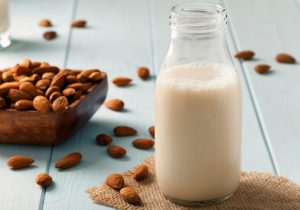Foods High in Calcium for Women’s Bone Health

A simple way to get enough calcium is to drink three eight-ounce glasses of milk every day. While milk can be a great choice for some, for others it is not. Whether they simply do not like the taste of milk or other dairy products or they are lactose-intolerant, many people choose not to consume dairy products.
Fortunately, there are many non-dairy foods that are high in calcium. Many high-calcium choices are not always that obvious. Some leafy green vegetables, like kale, actually contain more calcium than milk. Other leafy greens, like spinach, have almost no calcium.
Why is Calcium Important?
Calcium is essential for bone health and overall well-being. The amount our bodies need changes over a lifetime. Check below to find your age and see if you are reaching the recommended daily allowance:
- Children
- 1-3 years old: 700 mg
- 4-8 years old: 1,000 mg
- 9-18 years old: 1,300 mg
- Adults 19-50 years old: 1,000 mg
- Women 51 to 70 years old: 1,200 mg
- Men 51 to 70 years old: 1,000 mg
- Women and Men 71 and older: 1,200 mg (International Osteoporosis Foundation)
Non-Dairy Foods High in Calcium
If you do not like the taste of milk or your digestive system cannot tolerate it, there are other ways you can add calcium to your diet. Below are some non-dairy choices to consider:
- Almonds: An ounce of almonds (approximately 20 whole) offers 75 milligrams of calcium.
- Bok Choy: One cup of raw, shredded bok choy provides approximately 75 milligrams of calcium. You can find it year-round at many grocery stores.
- Breakfast Cereal: Many breakfast cereals fortify their products with calcium. In fact, some popular brands contain 200-600 milligrams per serving, so check the labels. If you have it with soymilk, you will boost the calcium content even more.
- Broccoli: Two cups of raw broccoli provide about 85 milligrams of calcium.
- Chia Seeds: Chia seeds offer more than double what almonds offer, at nearly 180 milligrams of calcium per ounce.
- Edamame: Not only is edamame high in calcium, it is also high in protein and fiber.
- Figs: Figs offer calcium — 120 milligrams per serving — and potassium, fiber and magnesium.
- Kale: One cup of raw kale provides 100 milligrams of calcium.
- Oranges: A large orange contains 75 milligrams of calcium. Calcium-fortified orange juice can contain nearly 350 milligrams per cup but be sure to check the label before you buy.
- Sardines: A 3.75-ounce can of sardines packs in nearly 350 milligrams of calcium. Try eating them with mustard and crackers or adding them to a salad.
- Soymilk: Because soymilk is calcium-fortified, it can provide as much calcium as milk.
- Tofu: Tofu can help you reach the daily calcium requirement quickly. One-half of a cup offers approximately 435 milligrams of calcium.
- White Beans: White beans contain fiber, iron and potassium — plus nearly 65 milligrams of calcium per serving.
Finally, if you are still low on calcium — even after adding more of these foods to your diet — check with your doctor to see if a calcium supplement might be right for you.
For More Information
The International Osteoporosis Foundation offers a calcium calculator you can use to determine if you are getting enough calcium. Try it now.
